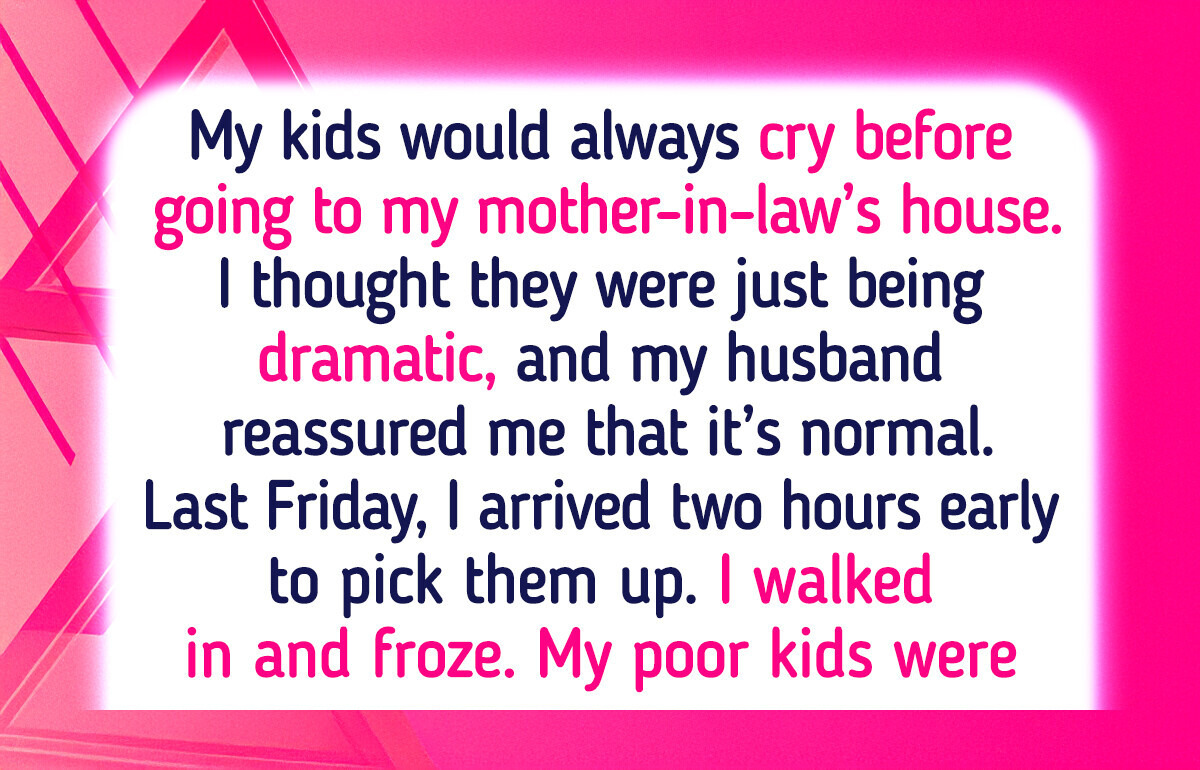12 Insane True Stories That Could Make a Tarantino Script Look Tame


Entering parenthood means your priority shifts to your children. It is a big responsibility, and sometimes, help from in-laws, relatives, and family can be a lifesaver. However, help turned into an unpleasant surprise for our Bright Side reader, who encountered toxic grandparent behavior from her mother-in-law.
Hello, Bright Side!
I’d like to have some advice about my current situation, which is stressing me out. My kids would always cry before going to my mother-in-law’s house. I thought they were just being dramatic, and my husband reassured me that it’s normal.
Last Friday, I arrived two hours early to pick them up. I walked in and froze. My poor kids were standing silently in the dim hallway, facing the wall. They weren’t speaking or moving. They didn’t even turn when they heard the door open. I was shocked, my heart was beating loudly.
I immediately ran to my kids to ask what had happened. When I touched my daughter’s shoulder, I noticed that she slightly flinched. This caused me to rush to where my MIL was, and when I asked what was going on, she said, “Ohh, they were misbehaving.” Her expression looked as if she had done nothing wrong. I looked confused, so she further explained, “I was disciplining them because they don’t behave.”
My blood started to boil, so I decided to grab my kids and walked out without saying another word. On our ride home, my daughter broke the silence, “Grandma does that every time we visit, Mommy. We can’t talk, we can’t move, and if we cry, we have to stand longer.” My heart sank as I held back my tears, my poor babies.
I have no idea how long this has been happening. I ignored the signs my kids have been showing, I’ve been dismissing them. I felt so awful, I pulled over to hug my children and assure them that I wouldn’t let it happen again. I can’t imagine my kids misbehaving to the point of deserving such punishments, they’re lovely, and I raised them well.
As soon as we got home, my husband welcomed me with questions as to why I stormed out and disrespected MIL. I told the kids to go to their rooms, they don’t have to witness an argument. It seems that she already told the whole family that I’m a dramatic and ungrateful daughter-in-law who disrespected her. My husband proceeded to tell me that I should apologize.
Why would I apologize? I didn’t speak a word in hopes of preventing something like this, even though I was furious. I kept my cool and prioritized my kids, who were suffering in silence for who knows how many afternoons. I don’t think I can leave my kids with her again, I just can’t trust her to be their grandma. She’s been instilling fear in my kids without our knowledge, she can’t be around my kids anymore.
My husband told me I was overreacting and being unfair to his mother. We never give punishments to our kids because I taught them how to express themselves, communicate, and behave themselves. They can be talked into behaving, they don’t need to face the wall for that! But how do I explain to him that this kind of “discipline” is unacceptable?
This is a difficult situation, and, understandably, your emotions are heightened. Your children’s welfare is your top priority, and it’s apparent that your mother-in-law’s techniques of discipline don’t align with your style of parenting. There are a lot of ways to discipline a child, and it can be based on one’s parenting style.
In this situation, your style and your MIL’s differ. There are ways to help children learn appropriate behavior. Like listening to them when they express their emotions to better understand how you can respond to the situation. This may help you further with your parenting and shed light on your MIL’s ways as well as your husband’s.
At the same time, you may consider that your husband may feel caught between his mother and his family, which is why he is asking you to apologize. A good step forward is to have an open and calm discussion with him.
Instead of focusing on blame, explain how the situation made you feel and, more importantly, how it affected the children. Talk about what your daughter told you about the frequent punishments, and make it clear that you are concerned with their emotional well-being, not just a disagreement with his mother.
You may also emphasize to your husband why it is an unacceptable “discipline” because you and MIL have different approaches, as there are four parenting styles that parents use.
You and your husband can discuss boundaries that you both feel comfortable with. Proper communication is necessary in this situation. Having a conversation with your mother-in-law to express your concerns and clarify how you want discipline to be handled in the future may also come into your consideration.
Finding common ground may help avoid further family conflict while ensuring your children feel safe and supported. But at the end of the day, the final decision is up to you.
Kids are a rollercoaster ride experience for a parent, and these children bring out the comedians in them. Read more about it with this link.











